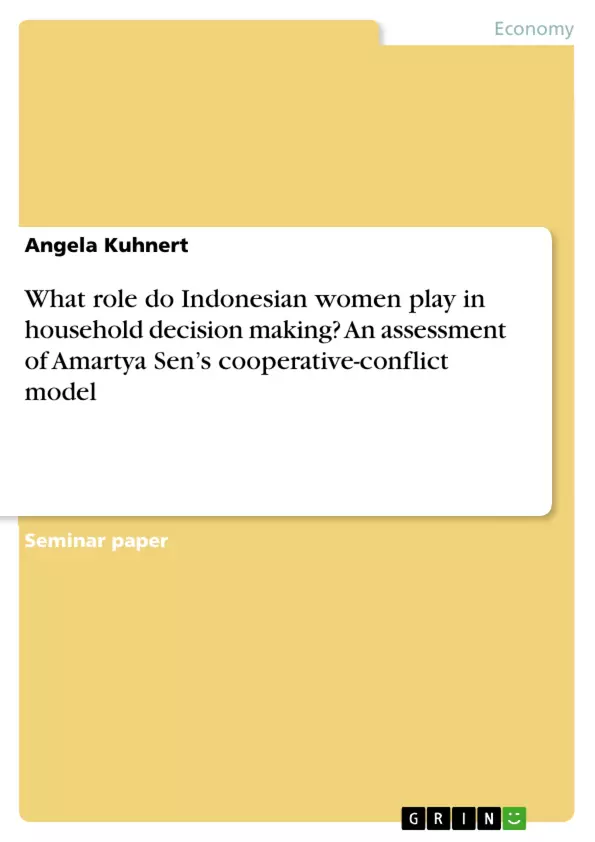Indonesia offers an interesting case in order to study the bargaining power of women within households. The country of Indonesia was created due to the Dutch colonial rule and consists of over 13,000 islands offering a wide range of ethnic variety with the largest ethnic groups being Javanese (41%), Sundanese (15%) and Maudareses (4%); still leaving another 41% belonging to other ethnic groups (The PRS Group, 2011). Furthermore while Indonesia is the country with the largest Muslim population in the world, they only make up 86% of the total population; other larger religious groups are Catholics, Protestants, Hindus and Buddhists (The PRS Group, 2011). This variety will offer different possibilities in order to investigate the role Indonesian women play in household decision making. In this context Amartya Sen’s cooperative conflict model will be assessed.
Households produce Z-goods, which are household resources, in order to gain utility leading to economies of scale which means that larger households can achieve the same level of Z-goods as a smaller household while needing less time and money (Himmelweit & Santos, 2008). In order to produce Z-goods most efficiently members of the household specialise, whereas the husband usually specialises in paid work while the wife specialises in unpaid work; however the specialisation becomes critical in case of an end of the household due to death, divorce or separation and suddenly the household is lacking either the person taking care of the household or the one earning money (Himmelweit & Santos, 2008). Yet the specialisation may also not be equally distributed between different members of the household and the welfare of all members may depend on one or more member’s caring preferences (Himmelweit & Santos, 2008).
Therefore this report will first explore the influence of caring preferences among household members. Afterwards two unitary models, Samuelson’s approach considering a household as a black-box and Becker’s rotten kid approach will be described. These models do not consider household members who do not have equal bargaining power and therefore Sen’s cooperative conflict model will be investigated. In order to assess his model the book “Schleier Sarong Minirock” by Berninghausen, Kerstan and Soeprapto-Jansen (2009) will be used in order to getting an idea of how women live in Java, Bali, Lombok and Aceh and how norms of society influence their life.
Inhaltsverzeichnis (Table of Contents)
- Introduction
- Literature Review
- Method
- Description and Discussion of evidence
- Conclusion
- Appendices
- References
Zielsetzung und Themenschwerpunkte (Objectives and Key Themes)
This report aims to examine the role Indonesian women play in household decision-making, particularly in the context of Amartya Sen's cooperative-conflict model. The report analyzes the influence of caring preferences, explores different unitary models, and investigates the implications of Sen's model for understanding women's bargaining power in Indonesian households.
- The influence of caring preferences on household decision-making
- Different unitary models of household decision-making, including Samuelson's black box and Becker's rotten kid approach
- The application of Amartya Sen's cooperative conflict model to understand women's bargaining power in Indonesian households
- The impact of social norms and cultural influences on women's roles and decision-making power
- The role of education and economic factors in shaping women's bargaining power
Zusammenfassung der Kapitel (Chapter Summaries)
- Introduction: This chapter introduces the research topic and provides context for the study of women's decision-making power within Indonesian households. It highlights the unique cultural and social factors that influence gender roles and family dynamics in Indonesia.
- Literature Review: This chapter delves into the theoretical framework for understanding household decision-making, focusing on the concept of caring preferences and its implications for individual and collective utility. It explores unitary models proposed by Samuelson and Becker, outlining their limitations in accounting for unequal bargaining power within households.
Schlüsselwörter (Keywords)
This report focuses on key concepts such as household decision-making, gender roles, bargaining power, caring preferences, unitary models, the cooperative conflict model, and Indonesian women's experiences within the context of social norms, cultural influences, and economic factors. It explores the influence of education and the impact of various social and cultural factors on women's autonomy and decision-making power within households.
Frequently Asked Questions
What is Amartya Sen’s cooperative-conflict model?
It is a model that describes the household as a place of both cooperation (to increase total resources) and conflict (over the distribution of those resources), where bargaining power depends on an individual's fallback position.
How do social norms affect women's bargaining power in Indonesia?
Cultural and religious norms in regions like Java, Bali, and Aceh influence gender roles, often specializing men in paid work and women in unpaid domestic work, which can limit women's financial autonomy.
What are "Z-goods" in this context?
Z-goods are household resources or "utilities" produced within the home (like meals or childcare) through the combination of time and purchased goods.
What is Becker’s "rotten kid" approach?
It is a unitary household model suggesting that even selfish members will act in the interest of the whole household if the head of the household is altruistic and controls the resources.
How does specialization impact women during a divorce?
Specialization in unpaid work leaves women vulnerable because they lack the independent income or market skills necessary to support themselves after the household unit dissolves.
- Citar trabajo
- Angela Kuhnert (Autor), 2012, What role do Indonesian women play in household decision making? An assessment of Amartya Sen’s cooperative-conflict model, Múnich, GRIN Verlag, https://www.grin.com/document/280168



